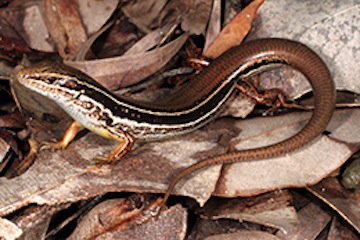Newly Found Lizard May Be Lost Soon

Say hello, and maybe goodbye, to the coastal plains skink — a new species of lizard discovered in Australia that researchers say is already on the decline.
The skink, named Ctenotus ora, lives in the sand dunes along Western Australia's Swan Coastal Plain, a stretch of coastline just south of Perth. A team of scientists says urban sprawl in the region has destroyed much of the little lizard’s natural habitat and is pushing it towards extinction.
"Although it’s a fantastic discovery, it's poor cause for celebration," Geoffrey Kay, of the Australian National University, said in a statement. "Our new lizard is under serious risk of being erased just as suddenly as it appeared to us. Only a few of these lizards have ever been found in the wild, so while we know numbers are low, we are not sure of the exact size of the remaining population."
The team recently described the skink, which is less than 3 inches (6 centimeters) long, in the journal Zootaxa.
The southwest corner of Australia is considered to be one of the top biodiversity hotspots in the world, alongside places like Madagascar and Brazil’s Cerrado. But growth in Perth the surrounding area has led to the expansion of residential developments that encroach on natural habitats.
"Developments along the coastline near Perth need to consider this new lizard and potentially a large number of other species yet to be discovered in this diverse part of the world," Kay said.
Follow LiveScience on Twitter @livescience. We're also on Facebook & Google+.
Get the world’s most fascinating discoveries delivered straight to your inbox.



